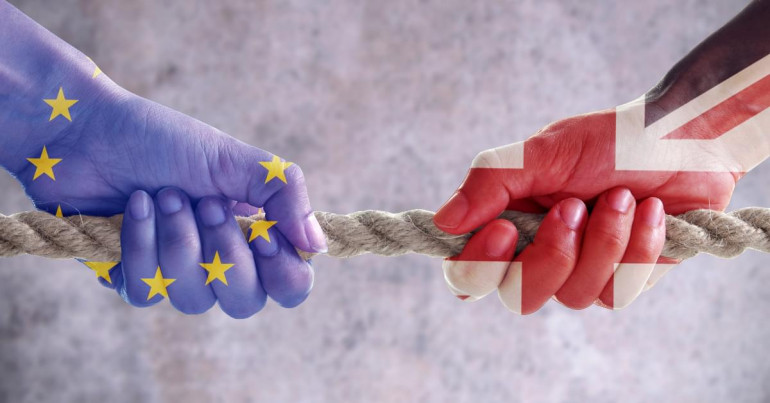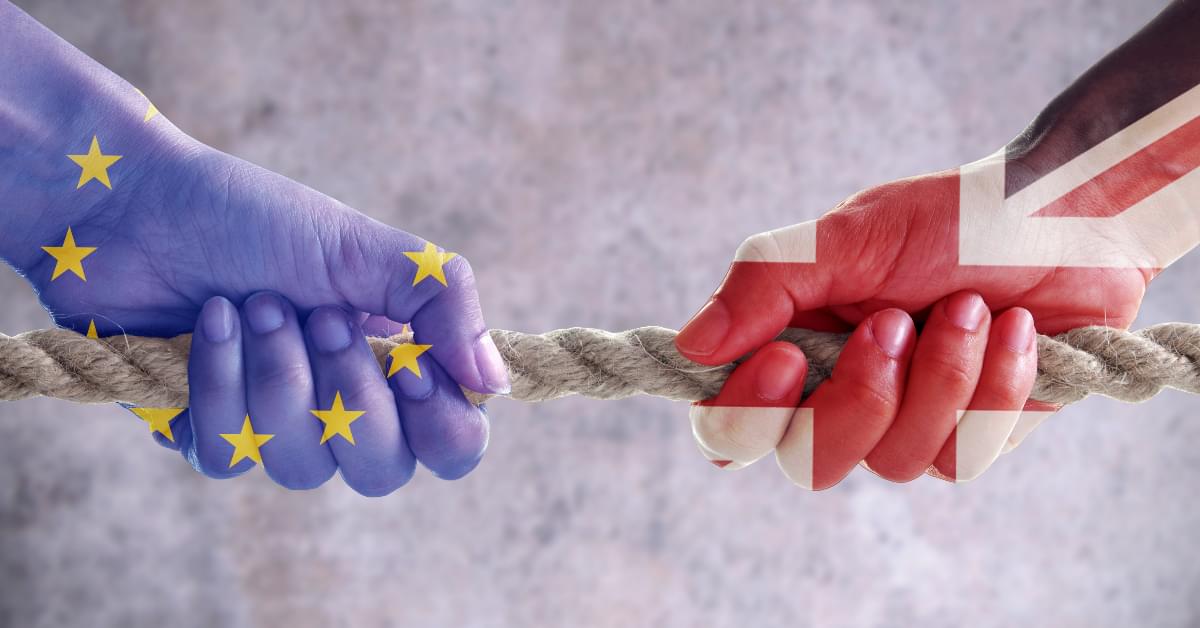
Brexit had an unprecedented effect on the global political and economic sphere once it was initially announced that the UK would be leaving the EU. More than six years since the EU referendum took place, the long term trade relationship between the UK and EU has been altered.
In this article, we will discuss the key factors which led up to Brexit taking place and how this has impacted international trade over recent years.

Brexit timeline: Key dates
After the UK-EU membership referendum took place in June 2016, the result was 51.9% to 48.1% in favour of the UK leaving the EU. This significant outcome has caused a shift in the relationship between the UK and EU ever since.
Prior to the voting date, in May 2015, following a Conservative Party manifesto pledge, the legal basis for the EU referendum was established through the European Union Referendum Act 2015. ‘Britain Stronger in Europe’ became the official group campaigning for the UK to remain in the EU. This group campaign was endorsed by Prime Minister David Cameron and Chancellor George Osborne at the time. ‘Vote Leave’ was the official group campaigning for the UK to leave the EU. The lead campaigners for this group were Conservative MPs Boris Johnson and Michael Gove.
Leading up to the referendum there were several factors which contributed towards the vote being in favour of Brexit. Key factors included sovereignty, the state of the UK economy and immigration policies.
On 17th July 2017, Brexit talks officially got underway in Brussels between EU and UK negotiators. Since the initial negotiations took place in July 2017, the UK has dealt with various challenges. One of the challenges is for the UK and EU to be on the same page regarding trade deals and policies. There has been somewhat of a disconnect between the UK and EU on policies and legislation. Additionally, the British political spectrum has brought two general elections and a third prime minister in this time, causing additional instability.
The UK officially left the EU on Friday 31st January 2020 and entered into a transition period. On 31st December 2020, the transition period ended and the UK officially left the EU single market and customs union.
How have trade relations changed post-brexit for the UK-EU?
Imports & exports have become more complex
Trade between the UK and EU has changed quite dramatically since Brexit. Leaving the EU has led to the creation of new customs and regulatory border between the UK and EU. Various industries and businesses had to adapt to changes to supply chains and associated costs. For example, companies now have to factor in additional tariffs and VAT costs for importing or exporting goods. All goods imported and exported has to respect customs requirements. This includes import and export declarations which can be up to €20 per declaration.
Pre-Brexit, British companies had free and frictionless trade across all member states. This made trade with EU member states simpler, and logistics more straightforward for companies. Since the UK is now outside the EU, imports and exports to or from any EU member state have to be treated in the same fashion as other international locations.
Whilst trading with EU member states, British companies now have more bureaucratic red tape to deal with. Costs for companies have also increased a great deal due to the additional admin and bureaucracy. As a result this has added huge amounts of time to the import & export process. This is impacting profit margins, making it increasingly difficult for UK businesses to remain profitable whilst trading with Europe.
Changes within legislation and tariffs have been introduced
On 27th April 2021 the European Parliament approved the EU-UK Trade and Cooperation Agreement. The parliament’s approval was needed in order to ensure the agreement entered into force on 1st May 2021. This was the last official step in formalising the new relationship between both parties. Due to the short period of time between the EU-UK trade agreement being signed and implemented, companies were pretty unprepared to face the changes in legislation.
Another issue which companies based in the UK are facing is the shortage of workers. This is specifically true in industries such as hospitality and retail. Shortages of staff in some sectors are now relatively common. In particular, shortages are within the types of roles that lower-skilled EU nationals would have traditionally been free to fill. According to The Telegraph, more than 90,000 EU workers left the UK’s hospitality sector in 2020-21.
Additionally, the UK government provided financial support to the hospitality sector due to the pandemic’s impact on businesses. Moving forward, both the UK and EU will need to remain aligned on employment law and workers rights. Failure to do so by either side shifting their rules too far right, could cause further tariffs being introduced.
Supply chain issues between UK & EU are apparent
When the UK came to the end of the withdrawal period in December 2020, the 12 months grace period allowed businesses to continue importing and exporting goods with pre-covid policies. However, businesses were suddenly found facing steep administrative costs when the grace period finished.
As a EU member, supply chains including networks of buyers and manufacturers between the UK and EU were integrated. Trade between the UK and EU could flow freely with no additional paperwork. But since the UK’s departure, these supply chains have ended. This has resulted in British businesses having to fill in a lot more paperwork in order to move goods.
Over time there could be the introduction of a more streamlined process for paperwork between the UK and EU. Currently, this is still an issue for businesses in the UK who are having to adjust to new regulations.
Has the Brexit referendum lived up to its initial promise for the UK?
The premise was based around the UK being stronger outside the EU as it would have greater control on policies for security and immigration. Nonetheless, the size of the task for the UK leaving the EU has been shown to be complex. Those in favour of leaving the EU had boasted that Brexit would be quick and simple, which proved to be the opposite. In reality coming to an agreement for a deal was hard to agree in practice. The UK had to secure three extensions of the Brexit deadline. Both sides ultimately struggled to agree on what terms the UK should leave the EU.
There are still disagreements within the current standing relationship between the UK and EU. The EU has recently taken new legal action against the UK government. This is over the UK’s plans to scrap parts of the post-Brexit deal for Northern Ireland. Ministers outlined a bill aimed at changing trade, tax and governance arrangements in the 2019 deal. The treaty was agreed by both parties, but the UK has said the EU has disrupted trade and power-sharing in Northern Ireland.
The EU has provided more details on its proposals to ease checks in Northern Ireland which they’ve commented should help to resolve concerns. These include an expanded trusted trade arrangement. This would cover more products and companies, ultimately lowering the cost of customs administration. Without a resolution on the current issues around Northern Ireland, this could lead to a trade war. A negative effect of that could be an increase in costs for consumers. As a result, this would possibly compound the effect of inflation on household budgets.

How has Brexit impacted currency exchange rates?
During the announcement of Brexit in June 2016, the effect of Brexit was evident immediately after the result. This saw sterling experience its largest fall within a single day in 30 years. The immediate market reaction of the Brexit referendum saw Pound sterling decline sharply in value. Brexit has been a key factor which has influenced exchange rate volatility.
Pound sterling suffered a decrease in price value and weakened in comparison to other currencies such as the US Dollar, post-Brexit. Although it was a real possibility of the UK voting to leave the EU, the result sent shocks throughout financial markets. For UK businesses importing and exporting goods within the EU, this would have been a turbulent time.
Additionally, the Euro currency can experience currency fluctuations. This is due to the European countries backed by the single currency. The fundamental issue with the Euro is that the 19 European countries backed by the currency, have both strong and weak economies. This ultimately impacts the value of the currency and market competitiveness.
Additionally for UK property investors or homeowners looking to purchase a home in Europe, there are greater challenges now compared to pre-brexit. As a result, when purchasing property abroad it pays dividends to set up a forward contract with a FX company. A forward contract essentially allows you to lock in an exchange rate today for a payment up to 12 months in advance. A forward contract can also be used for paying for imports and exports internationally. Since the value of a currency can fluctuate depending on market conditions and events, setting up a forward contract allows you to plan your payments in advance.
Post-Brexit UK-EU relationship: what can we expect in 2022?
The post-Brexit relationship between the UK and EU has the potential to improve. Although the dynamics of the trade relations have changed, the fact that both parties have a vested interest within the success of each other is significant.
Has Brexit been a success thus far for the UK & EU? Well the short answer is no. There are still ways to go for the relationship to be as favourable as it was pre-brexit. The overall aim for the UK-EU relations should be to maintain workers’ rights and work towards recreating more barrier-free, frictionless trading agreements for businesses.
Once inflation will show signs of beginning to lower and economies start to recover from this current economic downturn, both the UK and EU could look to introduce further trade deals. Both parties should be focused on providing less friction for businesses, which will ultimately help to limit red tape for international trade.
Omari Coates
Copywriter
Florence Couëdel
Editor



